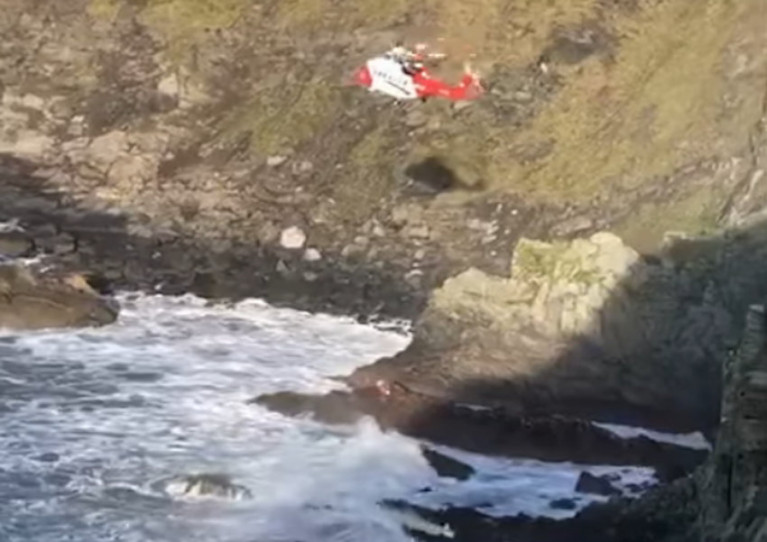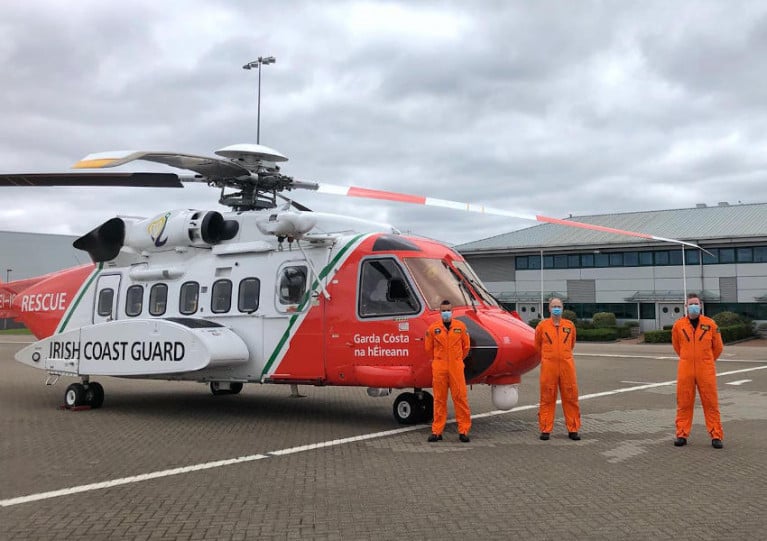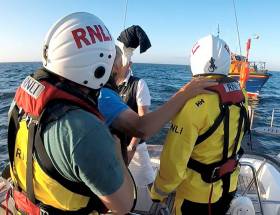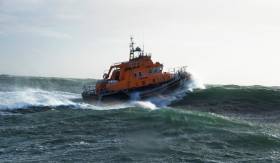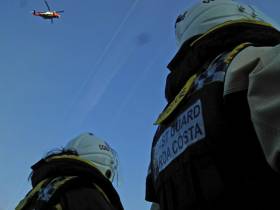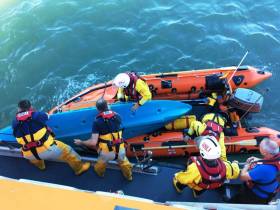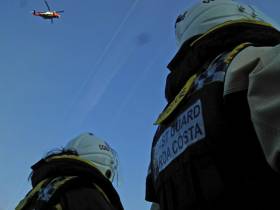Displaying items by tag: Rescue 117
A kitesurfer who sustained serious injuries in an incident in Co Wexford on Sunday (28 May) is expected to make a full recovery.
As the Wexford People reports, the casualty had been kitesurfing on Lady’s Island Lake south of Rosslare around lunchtime when it’s understood he collided with rocks.
Ambulance crew who attended the scene called on the Waterford-based Irish Coast Guard helicopter Rescue 117 to airlift the casualty from the scene for further treatment.
Future of Waterford’s Irish Coast Guard Helicopter Base in Doubt: Report
It’s feared that Waterford could lose its Irish Coast Guard helicopter base following the recent €800 million request for tender to renew the search-and-rescue contract, as The Times reports.
The tender document issued in December for a new long-term SAR service contract calls for the provision of a minimum of three helicopters with a fixed-wing aircraft on standby.
CHC Ireland — the current contractor on a 10-year, €600 million deal since 2012 — operates the existing service with five helicopters flying from four bases around the coast: in Dublin, Shannon, Sligo and Waterford, the latter of which flies with the code Rescue 117.
The new contract process comes as the Irish Coast Guard embarks on a series of reforms in the wake of the final report into the Rescue 116 tragedy as well as personnel issues afflicting the volunteer unit at Doolin. This week the coastguard issued a revised Safety Statement in support of these changes.
The Times has more on the story HERE (subscription required).
Coastal & River Rescuers Commended at 2021 National Bravery Awards
Individuals who risked their own lives to aid others in peril on the water made up the bulk of this year’s National Bravery Awards, which were presented by the Ceann Comhairle Seán Ó Fearghaíl on Friday (12 November).
The ceremony at Farmleigh House in Dublin’s Phoenix Park brought recipients together to receive their Certificates of Bravery for 17 acts of bravery. There were also nine Bronze Medals for Bravery awarded, while another six recipients received Silver Medals for Bravery.
“What these awards celebrate is the noblest impulse within a human being, to risk their life in order to save another,” the Ceann Comhairle said.
“We honour people who leaped into stormy seas, who braved swollen rivers, climbed down cliffs, assisted at road traffic collisions and performed other remarkable deeds. Through their actions there are people alive today who would undoubtedly have died.”
The crew of the Waterford-based Irish Coast Guard helicopter Rescue 117 were each awarded a Certificate of Bravery for their efforts to evacuate seven from a fishing vessel that sank at Kenmare Bay in March this year.
Sarah Courtney, Ronan Flanagan and Adrian O’Hara from Waterford and Aaron Hyland from Galway each received Certificates of Bravery, and for her actions Sarah Courtney was also awarded a Silver Medal.
Four visiting Americans were commended after leaping into action to rescue a young girl who was swept out to sea on an inflatable at Portmarnock Beach in July 2019.
Walter Butler — a member of the US Coast Guard — and his relatives Declan Butler, Eoghan Butler and Alexander Hugh Thomson from Arlington, Virginia each received a Certificate of Bravery.
Another incident at Portmarnock the following month saw Gerard Tyrrell receive a Bronze Medal and a Certificate of Bravery for his rescue of two girls blown out to sea on an inflatable flamingo.
Shane Moloney was commended for saving his father Noel’s life after the boat they were moving out of a field behind their North Cork home struck overhead power lines, delivering a near-fatal 10,000-volt electric shock.
Beth Darrer and Niamh McMahon each received a Bronze Medal and a Certificate of Bravery for their swift response to help rescue four young men who got into difficulty in the water at Inchydoney Beach in May 2020.
For her selfless actions in rescuing a father and his three daughters swept out to sea off Portsalon Beach in Co Donegal in July 2020, Jane Friel was awarded a Bronze Medal and a Certificate of Bravery.
Scott McQuaid was honoured with a Silver Medal and a Certificate of Bravery for his rescue of a young boy who had got into difficulty with his father when their kayak capsized at Ardreigh Lock on the River Barrow in Athy in February this year.
Zoey Lally rescued three teenage boys who were swept into the sea from Easkey Pier by a high wave in March this year, and received a Silver Medal and a Certificate of Bravery for her actions.
A number of gardaí were also commended in this years awards, with Garda Keenan McGavisk and Garda Róisín O’Donnell receiving Bronze Medals for their rescue of a distressed man from a fast-flowing river in Ardee, Co Louth in March last year, and Garda Caroline O’Brien also getting a Bronze Medal for saving the life of a young man who entered the water near St John’s Quay in Kilkenny in July 2019.
And 26 years after her crucial lifesaving actions, a Silver Medal and Certificate of Braver were awarded to Susan Hackett for the rescue of two young people who got into difficulty while swimming in the River Suir new Newcastle, Co Tipperary in the summer of 1995.
The National Bravery Awards are awarded annually by Comhairle na Míre Gaile – the Deeds of Bravery Council – which was founded in 1947 to enable State recognition of exceptional acts of bravery.
The council is chaired by the Ceann Comhairle and includes the Cathaoirleach of Seanad Éireann, the Lord Mayors of Dublin and Cork, the Garda Commissioner, the President of the Association of City & County Councils and the chairman of the Irish Red Cross.
Body Recovered Off Old Head of Kinsale in Search for Missing Person
Cork Beo reports that a body was recovered off the West Cork coast in a multi-agency operation for a missing person on Sunday (27 December).
Thermal imaging was used to locate the remains in the area of the Old Head of Kinsale.
The crew of the Irish Coast Guard’s Waterford-based helicopter Rescue 117 were praised on social media for their bravery in recovering the body amid severe winds ahead of Storm Bella.
The incident came within days of the discovery of a body in the water at Dun Laoghaire’s Coal Harbour pier, which is being investigated by gardaí.
On Saturday morning (29 August) the Irish Coast Guard was called on short notice to carry out the high-priority transport of a child to the UK for urgent medical treatment.
The Waterford-based coastguard helicopter Rescue 117 was scrambled for the important mission, with the crew flying the little boy to RAF Northolt in north-west London.
From there the young patient was transferred to the city’s King’s College Hospital for a lifesaving organ transplant.
“This multi-agency operation saw many people and agencies involved,” the Irish Coast Guard said. “Well done to all those involved.”
A man was taken to hospital with hand injuries by Irish Coast Guard helicopter after a Mayday call on a yacht off Kilmore Quay on Saturday (29 June).
The local RNLI lifeboat crew were en route to another vessel that had requested a tow when the call came in from a 12m yacht some 13 miles south-west of the Co Wexford village.
It was reported that as the yacht’s crew were adjusting a sail, a piece of rigging had parted and seriously injured the skipper’s hand.
The lifeboat arrived just after the Waterford-based coastguard helicopter Rescue 117, whose crew determined the best course of action was to transfer the casualty to the lifeboat for pain relief.
He was subsequently winched to the helicopter and flown to Waterford University Hospital for further treatment.
Rosslare Harbour Lifeboat Assists In Evacuation Of Ferry Passenger Taken Ill On Late Night Crossing
#Lifeboats - The RNLI’s all-weather lifeboat based in Rosslare Harbour was launched at 10.38pm on Saturday night (2 March) to assist a passenger onboard an Irish Ferries vessel bound for Pembroke in Wales.
The passenger ferry Oscar Wilde, which was located 20 miles off the Wexford coast at the time, asked for assistance in evacuating a passenger who had become ill.
Sea conditions were unfavourable for the volunteers on the Rosslare Harbour lifeboat to go alongside the ferry.
The Irish Coast Guard helicopter Rescue 117 from Waterford was also tasked and quickly arrived on scene. After attempts to airlift the casualty it was deemed too dangerous.
The Oscar Wilde returned to Rosslare Europort at 1am, where an ambulance was waiting to bring the casualty to hospital. The RNLI volunteers in their Severn class lifeboat stood by the passenger ferry for the duration.
Sea conditions were very poor at the time, with a strong Force 7 to 8 gale and heavy rain.
Coxswain Eamonn O’Rourke commented that the volunteer crew of the lifeboat had to endure very challenging conditions.
Speaking afterwards, Rosslare Harbour RNLI lifeboat operations manager David Maloney said: “Conditions at sea tonight were challenging for our coxswain and lifeboat crew and I would like to commend them for their efforts in enduring a rough passage in the dark, and late at night on a Saturday evening, to be of assistance.”
Fall From Helicopter Winch ‘Unlikely’ To Have Led To Death In Hook Head Rescue Tragedy
#Coastguard - The Irish Coast Guard crew winching two teenagers from the sea when one fell from her harness had never lifted two casualties at the same time before, as BreakingNews.ie reports.
Aoife Winterlich, 14, was one of four teenagers who had been swept into the sea off Hook Head during an outing for venture scouts on 6 December 2015.
Two managed to swim ashore but Winterlich got into difficulty in heavy seas. The fourth, a 15-year-old boy, attempted to keep her afloat until rescue arrived minutes later.
It was when Rescue 117’s crew attempted to transfer the pair into the helicopter that Winterlich slipped from her strop some 45 feet back into the water.
Records show that the winchman was back in the water to retrieve Winterlich within moments, and that she was in the helicopter just over a minute after.
The inquest into Winterlich’s death this week heard that she died from lack of oxygen to the brain resulting from near drowning, and that there was no evidence of contributing physical trauma.
Prof Maureen O’Sullivan of Our Lady’s Children’s Hospital in Crumlin, who conducted the post-mortem, said the fall was unlikely to have contributed to Winterlich’s death, according to RTÉ News.
The inquest also heard that the coastguard helicopter’s winchman and winch operator had never performed a lift of more than one casualty in a single lift.
Winch operator Neville Murphy told Dublin Coroner’s Court the situation that led his college Sean Jennings to descend with two winch strops was “unprecedented”.
“Two people in the water, that generally doesn’t happen,” he said. “We can only train to certain limits. We can never know what we are faced with as we look out the door of the aircraft.”
Earlier this year, the Air Accident Investigation Unit report into the incident concluded there was “nothing to suggest that the winchman’s decision-making was anything other than sound”.
The inquest is adjourned till October. BreakingNews.ie has more on the story HERE.
#Rescue - The Arklow lifeboat joined Courtown RNLI and the Irish Coast Guard in a multi-agency rescue on Friday evening (11 August) after a teenage girl fell from an inflatable ‘doughnut’ being towed by a jet ski in Courtown Harbour.
Once on scene, around a mile east of Ardamine Beach south of Courtown, the Arklow lifeboat volunteers assisted their Courtown colleagued who were already in the water dealing with the casualty, a 13-year-old girl with suspected spinal injuries.
Arklow RNLI worked to clear the area of other vessels to allow for a safe airlift by the Waterford-based coastguard helicopter Rescue 117.
In the process, they picked up three other casualties — kayakers who had entered the water to assist in the rescue but found themselves adrift.
Independent.ie and The Irish Times have more on the story.
#Skibbereen - TheJournal.ie reports that a 14-year-old boy is in critical condition after he was struck in the head by a boom while yachting off Skibbereen yesterday morning (Saturday 24 June).
The teenager was airlifted to Cork University Hospital by the Irish Coast Guard helicopter Rescue 117, and the latest news from Independent.ie is that his condition was improving.
Elsewhere yesterday, Howth Coast Guard attended a 53-year-old man with serious head injuries sustained while kitesurfing off Sutton in North Co Dublin.
And Shannon’s Rescue 115 was called to Inis Mór in the Aran Islands for the medevac of a woman who suffered spinal injuries while taking part in the Red Bull Cliff Diving World Series event.



























